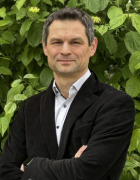
Prof. Dr. Michael Pester
Academic Career and Research Areas
Prof. Pester (*1978) conducts research in the field of microbial (eco-)physiology. Major focus areas are ecosystem services that microorganisms provide for us humans and understanding how microorganisms contribute to biogeochemical cycling in freshwaters and soil. His research aims at the discovery of novel microorganisms, new metabolic pathways and the quantification of microbial ecosystem services.
Michael Pester studied biology at the University of Konstanz and completed his doctorate at the Max Planck Institute for Terrestrial Microbiology. After his postdoc at the University of Vienna, he continued his work as a junior research group leader at the University of Konstanz, where he habilitated in 2017. The same year, he accepted an appointment at the TU Braunschweig and headed in parallel the Department of Microorganisms at the Leibniz Institute DSMZ. Since 2025, Prof. Pester leads the Chair of Microbial Physiology at TUM.
Awards
- Appointment as an expert in the German Central Commission on Biosafety (2020)
- Fellow of the Zukunftskolleg of the University of Konstanz (2014)
- Fellow of the Alexander von Humboldt Foundation (2007)
- Fellow of the Fulbright Foundation at the University of North Carolina (2000)
Key Publications
Dyksma S., Pester M.: Growth of sulfate-reducing Desulfobacterota and Bacillota at periodic oxygen stress of 50% air-O2 saturation. Microbiome 2024; 12: 191.
AbstractDyksma S., Pester M.: Oxygen respiration and polysaccharide degradation by a sulfate-reducing acidobacterium. Nature Communications 2023. 14: 6337.
AbstractNgugi DK, Salcher MM, Andrei A-S, Ghai R, Klotz F, Chiriac M-C, Ionescu D, Büsing P, Grossart H-P, Peng X, Priscu JC, Salmor A, Pester M: Postglacial adaptations enabled colonization and quasi-clonal dispersal of ammonia-oxidizing archaea in modern European large lakes. Science Advances (2023); 9: eadc9392.
AbstractDiao M, Dyksma, S., Koeksoy, E., Ngugi, D.K., Anantharaman, K., Loy, A., and Pester, M. (2023) Global diversity and inferred ecophysiology of microorganisms with the potential for dissimilatory sulfate/sulfite reduction. FEMS Microbiology Reviews 47: fuad058.
AbstractKlotz F, Kitzinger K, Ngugi DK, Büsing P, Littmann S, Kuypers MMM, Schink B, Pester M: Quantification of archaea-driven freshwater nitrification from single cell to ecosystem levels. The ISME Journal 2022; 16: 1647-1656.
AbstractIf you wish your profile to be changed or updated please contact Franz Langer.